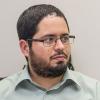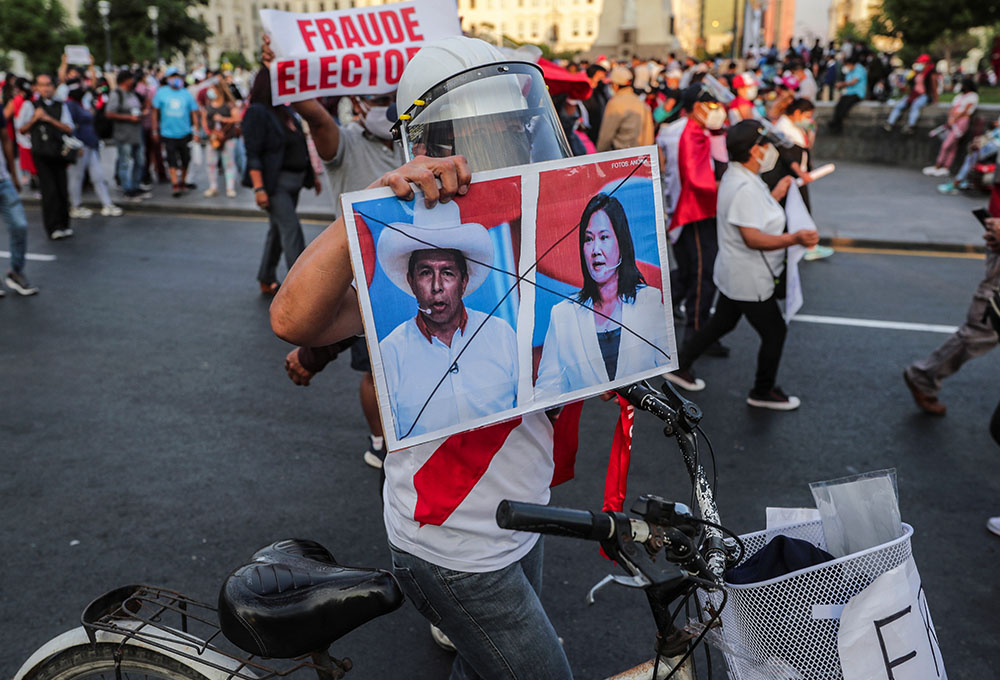
A protester in Lima, Peru, on April 17 holds a sign showing crossed out images of candidates Pedro Castillo and Keiko Fujimori, who will face each other in the second round of Peru's presidential election on June 6. (Newscom/Reuters/Sebastian Castaneda)
Most Catholics still don't know what to do about the second round of Peru's presidential elections, which will be held June 6.
The candidates who gained the most votes in April 11's first round — the socialist teacher and labor leader Pedro Castillo and the right-winger Keiko Fujimori, daughter of the former autocrat Alberto Fujimori — don't seem to be the ideal choices for many in the South American country.
Indeed, the support they received wasn't high: Castillo obtained 19% of the vote and Fujimori 13%. Most of the remaining ballots were split among eight other candidates.
Analysts say the political polarization manifested in the high number of contestants (18 politicians ran for the presidency) and the absence of any figure who could draw major popular support are signals of a deep social and political crisis in Peru.
"Those choices are a fruit of the general dissatisfaction of the Peruvian population and of the broad political corruption," Peruvian theologian Rocio Figueroa, a lecturer at Good Shepherd College in New Zealand, told NCR.
Peru has had five presidents since 2016. Corruption scandals and political instability provoked successive impeachments and resignations. Bribery charges involving the Brazilian construction company Odebrecht led to the indictment and prosecution of four former presidents. Keiko Fujimori was also charged with corruption and was detained for a few months.
Figueroa said Peru's mismanagement of the COVID-19 pandemic also impacted the peoples' perceptions of the political system. There have been about 62,000 deaths up to now and the vaccination rollout has been slow, with only about 700,000 people fully immunized as of May 11. (The total population is 32.5 million).
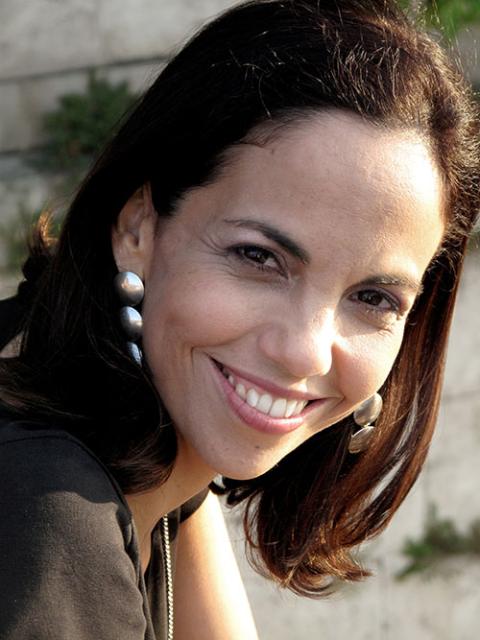
Rocio Figueroa (Courtesy of Good Shepherd College)
"Informal labor is huge, and the GDP fell by 11% in 2020, with a severe impact on the poor. That's the consequence of decades of neoliberal administrations," Figueroa added.
In her opinion, Castillo's platform, which includes plans to nationalize several economic segments and change the constitution in order to advance reforms, is "radical" and "populist."
"On the other side, Keiko Fujimori employs anti-communist rhetoric to oppose Castillo. But she is the daughter of one of the most corrupt politicians in Peru's history, someone who ruled with authoritarianism," Figueroa said.
Theater director and teacher Ivo Macha, from Lima, thinks he'll only be able to make a decision when the second round is closer.
"Between a candidate whose platform is similar to [late Venezuelan leader Hugo] Chávez's and another candidate who's involved in corruption, I don't know what to do," he told NCR.
Macha, who's a member of the Charismatic Catholic Renewal movement, voted for the conservative Catholic candidate Rafael López Aliaga in the first round. "He's pro-life. Fujimori and Castillo also say they're pro-life, but how can corruption and socialism relate to pro-life policies?" Macha lamented.
Macha said his group does not have a uniform position on the election. "Many of us are dissatisfied with both" of the final candidates, he said. Many of his parish friends, however, have already decided to vote for Fujimori.
Although many in Peru don't identify with either of the candidates, political polarization in the country skyrocketed after the results of the first round were released. Particularly on social media, clashes between those on the left and right sides of the political spectrum have been fierce.
Some Catholics have expressed particular concern about Fujimori's strategy to label Castillo and groups that support him as being in the extreme far left.
Often amplified in media coverage, such tactics involve efforts to connect leftist and progressive activists to the armed communist organizations that were responsible for the violent insurgency in the 1980s and 1990s: Sendero Luminoso (Shining Path) and Movimiento Revolucionario Túpac Amaru (Túpac Amaru Revolutionary Movement).
That strategy has even received a name, terruqueo, which is a mixture of Spanish and Quechuan terms for terrorism and refers to a political strategy that uses the fear of terrorism to benefit a political party.
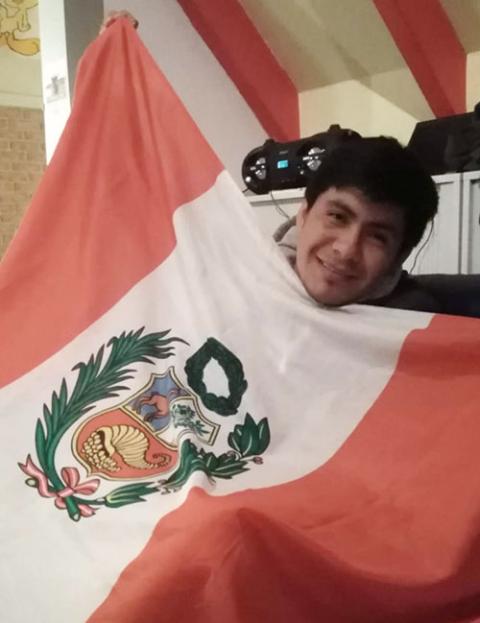
Felipe Vega Fernández displays a Peruvian flag. (Courtesy of Felipe Vega Fernández)
"Anyone who thinks in a different way about the hegemonic system is called a terrorist," said Felipe Vega Fernández, national coordinator of the Young Christian Workers. "They say that Castillo will implant a communist regime, that we'll have a dictatorship like in Venezuela. This is terruquear."
In a May 8 speech at a political rally, one of the candidates who lost in the first round of the election, López Aliaga, even exclaimed: "Death to communism. Death to Cerrón and Castillo," referring to Vladimir Cerrón, the leader of the political party that Castillo represents.
López Aliaga, a far-right candidate who claims he is a member of the Catholic group Opus Dei, drew immediate condemnation from Peruvian human rights defenders and from current and former Cabinet ministers.
Although he did not refer to the incident directly, in his May 9 homily Lima Archbishop Carlos Castillo quoted a recently deceased Catholic politician who once wrote that in Peru "we have an individualistic Catholicism that only wants to save its soul, and which is indifferent to the reality."
"In the effort to save its soul, it only thinks of itself and therefore denigrates all who do not think as it does," said the archbishop.
Vega Fernández and his colleagues have been organizing virtual talks about terruqueo and the attempt to demonize the left wing. "Our goal is to give people a few tools that will allow them to adequately reflect and make their decision," he told NCR.
If uncertainty is plaguing many segments of the population, some Catholic movements of workers and peasants, often connected to the liberation theology tradition that had a prodigious development in Peru in the 1970s, are supporting Pedro Castillo.
A Catholic himself, Castillo says he is a socialist in political and economic terms, but a conservative on moral issues. He has already declared that he opposes so-called "gender ideology," the legalization of abortion, and same-sex marriage.
"He comes from a poor family in Chota, Cajamarca, and reflects our moral formation in Peru. The inclusive agenda is not in his plans. But he proposes another economic model," Vega Fernández explained.
Advertisement
Hernán Armas, the national coordinator of the Christian Workers Movement in Peru, said that the need for a social transformation is the reason why he'll vote for Castillo.
"We don't support him because we want to be like Venezuela, but because we want change," he told NCR.
Armas said that most Catholics are not supporting Fujimori, but some recent polls suggest she may be catching up to Castillo. Armas believes that conservative bishops will back Fujimori.
"The episcopate and many Catholic movements don't want to publicly take a side. But our base communities are worried," Armas added.
The election seems to have revived long-simmering resentments over the violent fighting in the 1980s and '90s, when the conflict between the communist insurgent groups and the government led to tens of thousands of civilian deaths.
Alberto Fujimori is largely credited with stopping the insurgency, but he gave the military broad license to pursue its campaign against the insurgents. A 2003 Truth and Reconciliation Commission said government forces had indiscriminately destroyed villages and tortured suspected terrorists.
Alberto Fujimori has been in and out of prison since 2009, convicted on various charges of human rights abuses, embezzlement, and phone-tapping opposition politicians.
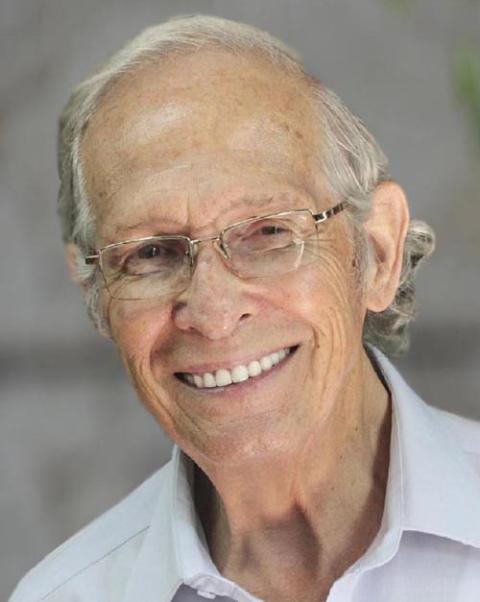
Fr. Alejandro Cussianovich (Courtesy of Alejandro Cussianovich and Ifejant)
Fr. Alejandro Cussianovich, a Peruvian who is an expert in the political dimension of education, said the conflicts in the 1980s and '90s generated a society of "winners" and "losers."
"There has never been a reconciliation," the priest told NCR. "You either won or lost. And for the winners everything is legitimate. So, when people talk about change, they say: 'Don't talk like that. This is what the losers say.' "
Cussianovich said many Catholics don't evaluate the political candidates on their proposed solutions to issues such as poverty, social exclusion and racism — preferring instead to follow what the priest termed "formalist guidelines from the church" about the election.
In his opinion, the current state of affairs is the result of profound social inequalities built up over decades. "The country's memory, the narrative on what happened, has been reconstructed in an extraordinarily shocking way by the media, and not by society itself," he said.
"People have to vote according to their conscience," Cussianovich said, before asking: "But what if their conscience is disturbed?"
